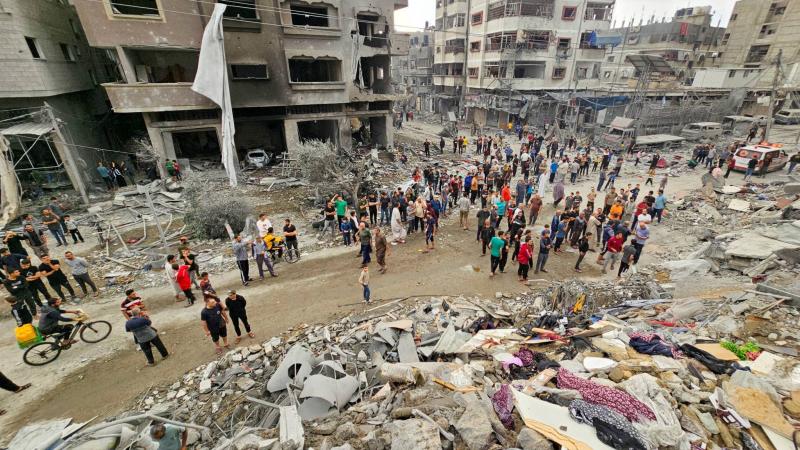Following the bloody attack by "Hamas" on October 7, there have been numerous expectations and false imaginings. These imaginings are akin to daydreams, led in the initial weeks by poets, speakers, and newcomers to politics, who influence social media. As for why "Hamas" itself ruled out a massive invasion, leader Abu Marzouk stated, "We did not expect Israel to respond with such barbarism!"
The first erroneous assessment: Israel would not dare to invade Gaza on the ground, risking thousands of its soldiers in "Hamas's" stronghold. If Netanyahu did so, the enclave would become a graveyard for his army. The West Bank would rise against them, tens of thousands of "Hezbollah" missiles would destroy Tel Aviv, and the enemy would be forced to sit down and concede, or Israel would collapse, and its inhabitants would flee back to New York and Moscow.
The second imagination: the world would not allow or remain silent about the invasion. The truth is that Netanyahu did not seek permission, and the major powers did not object. Before the invasion, Netanyahu distributed a 45-minute video to governments, media leaders, and influential figures like Elon Musk, depicting what he described as "Hamas crimes" on October 7 to pave the way for the devastating invasion. In response to accusations of barbarism and excessive violence, the Israeli Prime Minister stated in the US media: "What happened to us on October 7 is a hundred times greater than what happened to you on September 11."
The third: hostages are a deterrent and a guarantee! 253 hostages in "Hamas's" grip later proved not to stop the invading tanks. Why did "Hamas" use one captured soldier (Shalit) for bargaining for five years, and this time took hundreds of hostages with Israel showing no interest in rescuing them? Human consideration for its hostages was not a priority for Israel, which declared that its existence and security were paramount. As a "small state in a sea of enemies," Israel relies on its military superiority as a deterrent policy, so that its adversaries realize that it is capable of destroying them. Israel took "Hamas's" October attack and the kidnapping of its citizens as a justification for its invasion, launching a military operation—the largest since the 1973 war.
The fourth false perception: Ukraine and international balances favoring "Hamas." It was claimed that the engagement of European and US countries in the strategically significant Ukraine war would limit their political and military support for Israel. In reality, these countries have enough surplus power to wage multiple wars, and Israel received doubled military support to counter its adversaries.
The fifth false imagination: the unity of arenas. There was considerable speculation and betting on "Hezbollah" entering the war. This analysis did not take into account Tehran's calculations, which differ from "Hamas's." Iran plans to stir crises within the political bargaining with the US and Israel, not to fight them or liberate Palestine. Activating what was called a unity of arenas could mean exposing its proxies to destruction, specifically "Hezbollah." The imaginer's expectation, at the crisis's onset, was that these resistive forces would rush to participate in the war, preventing Israel from isolating "Hamas," forcing it to accept a ceasefire. As we have seen, "Hamas" was left to its fate. The imaginers did not misjudge the importance of "Hezbollah's" involvement in reducing fighting duration and casualties, but they misunderstood Iran's regional strategy and calculations. Israel warned "Hezbollah" at the war's beginning that what was done to it in 2006 was merely a stroll. Indeed, the "July War" was limited compared to what Israel is doing in Gaza this time. "Hezbollah," for its part, openly repeated its assurances to the Israelis that it did not wish to enter the war.
The only team tied to Iran that entered the battle was the Houthis in Yemen, targeting commercial shipping in the Red Sea and the Arabian Sea. This involves less political and material cost for Iran, and I expect it to achieve Tehran's goals, as the "Prosperity" alliance may be compelled to engage with Tehran to contain the Houthis. Israel, which did not suffer significantly, found in the Houthi attack its desire to see a military alliance formed under Washington's leadership to engage in a parallel war. It cannot be overlooked that Saudi Arabia, on this side, which refused to participate in the alliance, bolstered its gains and reaffirmed its old position in the war in Yemen. Israel did not lose, and "Hamas" did not benefit from the Red Sea crisis.
The sixth: betting on international public sympathy to pressure the West and Israel to stop the war. As we can see, four months have passed, and public demonstrations and protests have failed to halt the war or alter political stances. In the Gaza war, the volume of international public sympathy, even in the US and the UK, has been immense. The anti-war movement is always present in the West but has never significantly changed much. The current situation resembles the months leading up to the Iraq invasion in 2003, when the streets of Western capitals were flooded with protests that failed to dissuade world leaders from their decisions. I recall during Sharon's invasion of Beirut in 1982, the tents erected for demonstrators along Pennsylvania Avenue in front of the White House, participated in by MPs, activists, and live television coverage. Sharon entered Beirut, destroyed those in his way, and expelled Arafat and his men.




